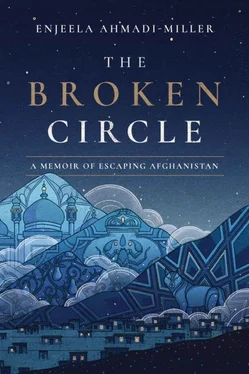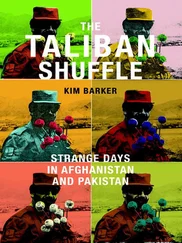“You better enjoy this,” Ahmad Shah quipped. “Tomorrow you will get the usual, cornflakes and water.”
Everyone laughed. I thought of the absurdity of my brother’s humor: Mommy had prepared for our arrival—my new clothes, the beautiful house—and now that we were here, she nurtured us with her good cooking. The kitchen was filled with laughter and an abundance of satisfying aromas, and next to me, Padar sipped his chai contentedly, relaxed, as if a large burden had been lifted off him. Vida’s constant laughing and chattering revived a memory of what it had been like those many years ago in Kabul, when we had lived together and shared our lives in those days of happiness. I glanced around and took it all in, so much at one time: it had been something like this moment.

An hour later, a large black car pulled into the driveway, and a man dressed in black livery jumped out and opened the back door. He ushered the three of us into the back seat. Vida sat between Mommy and me, trying to contain her enthusiasm with a subdued squirming. On the way to the market, we passed little rickshaws, some motorized and others pulled by boys furiously pedaling bicycles. I wondered at how my fortune had changed so quickly, and now I was riding in the back of a chauffeured car. The sudden luxury felt a little odd to me, after so many days of riding buses and mules and carrying everything I owned in my backpack. But then Mommy had always demanded the best things in life, and here in India she didn’t appear to lack for anything.
After a drive through bustling city streets, the car pulled to a curb. I stepped out into a vibrant market full of people on the move. The morning air was already hot and stifling. Cars, rickshaws, and carts pulled by animals jammed the street. Boys on motorcycles darted in between traffic in almost daredevil moves, and music filled the air. The kind of music, loud and lively, that made me want to dance. I found myself wanting to shimmy a bit on the sidewalk as I tried to take it all in. Right in front of us, down a long street filled with stores, merchants had piled their wares on the sidewalk, on tables and on racks, in front of their stores. The road was filled with shoppers in bright clothes, coming and going, inspecting goods, making purchases, and eating. The unmistakable smell of food was on the breeze—the sharp aroma of curry and earthy turmeric and delightful incense.
“Come on,” Vida said, pulling me after her. Mommy was already making her way down the street. Catching up with her, I couldn’t help but notice that she didn’t move with the same vitality she had in Afghanistan. Her feet shuffled as if she couldn’t take a full step, though she kept plugging forward. Her heart problems had taken a toll on her health, but she didn’t let it spoil her desire to do things for her family. I followed her to the first shop, a fabric store with bolts of cloth leaning against the front window. So many colors, so many choices. I ran my hand down one—bright pink with embroidered gold flower blossoms.
“Do you like that one, Enjeela?”
I imagined myself in an outfit I’d seen so many other girls in the marketplace wearing: the shalwar kameez, with tapered pants and a long tunic with long sleeves. I’d seen some girls wearing them in Pakistan, but here everyone wore them.
“Yes, it’s very nice,” I said.
Mommy took the bolt inside to make a purchase while Vida and I chatted outside on the curb. I couldn’t help but take in all the new sights as my sister rattled away about all the stores she wanted to visit and how many things she wanted to show me and buy me. Across the way from us, one store caught my attention. It had only one table in front of it, and it was piled high with green leaves. They were arranged in fans, like how one would spread out a deck of cards. An old man with wrinkled dark skin sat cross-legged on the ground next to the table. He wore baggy pants covered with stains, and his chest was bare. He held one of the leaves, which was rolled up, and stuffed it in his mouth, working his jaw hard to chew it. He noticed me staring and smiled. His mouth was nearly toothless, and dark-red juice dribbled down his chin. He’s bleeding, I thought.
“Vida.” I grabbed her arm to steady my shaking hands. “What’s wrong with that man?”
Just then, Mommy came up beside me and must have seen the shock on my face and figured out what I was staring at. “That’s paan .” She pointed to the tables. “See the leaves on the table? Those are betel leaves. They take those and stuff them with areca nuts and spices. It’s not good—don’t ever try it.” Her voice was curt. She took my hand and led me away down the street. I couldn’t help glancing back at the old man as he stuffed another rolled-up leaf in his mouth.
“What’s wrong with paan ?” I asked.
She fixed me with a glare. It was part warning that I should listen carefully and part exasperation that I was pushing the limits of her tolerance. “It’s worse than cigarettes. It makes people crazy, and it gives them cancer. So stay away from it.”
She didn’t have to tell me twice.
We continued down the street, past shops and restaurants and tea shops, and turned into a clothing store. Vida helped me pick out a shalwar kameez. I couldn’t wait to try it on. Both pieces, the tunic and slacks, were sky blue. After I tried them on, I spun around in the dressing room, letting the legs flare out. They were comfortable and fashionable, and I decided to wear them the rest of the day. I picked out a pair of new shoes, and before we left the shop, I tossed my old ones in the trash.
Farther down the road stood a large fruit and vegetable market. Mommy picked out what she planned to cook for dinner while Vida and I strolled among the colorful food stacked high on displays: yellow mangoes, green limes, red pomegranates, bunches of leafy greens that at first I didn’t think were safe to touch because they looked so much like those dreaded paan leaves. Deep-purple eggplants were heaped up in large piles. We passed barrels of red rambutan with their greenish spikes, yellow breadfruit, and red guavas, which were sliced open to display the bright redness of their flesh. I touched all of them, relishing their textures; some were soft and pliable, others hard and cold. I hadn’t seen a market so full of so many different fruits and vegetables at any time I could remember. I wanted to taste each one and savor the flavor in my mouth.
Vida gathered a few pieces of fruit, and we brought them to Mommy, who added them to her purchase. “There’s so much here,” I said. “Can we buy more?”
She smiled at me, almost in a consoling way. “Not today. We have plenty of time together. No one is going anywhere.”
Her words were so tender and loving, I could feel tears welling in the corners of my eyes.
I reached up on the tips of my toes, put my arms around her shoulders, and kissed her cheek. “I missed you.”
“I missed you too.”
We looked at each other for a long moment. And I could tell from her face that she meant what she’d just said. In the middle of that crowded market, something good passed between us, an understanding that we had been apart from each other too long and it would never happen again.
Vida pulled me out of the moment, urging me to follow her into the street, where the music, which came from every direction, had grown louder. I shielded my eyes in the blazing sunlight that beat down on the crowded street. Vida clasped my hand and swung our arms with the beat and sang along with the lyrics. Shopping here was as much a celebration as anything else.
We followed Mommy from shop to shop, where she bought us little things—books, toys, sweets, inexpensive jewelry—just about anything we asked for. Money didn’t seem to be a problem. After the frugal days we spent in Peshawar, her spending felt extravagant. Even though I hesitated to pick things out, Vida urged me on. I couldn’t help but think about days in the mountains, when we ate bits of meat and cold bowls of vegetables, or the months in that Peshawar hotel, living on milk and soggy bread, and we wore the same clothes for months at a time. Now I was walking through this market, where every food was available at my fingertips. All the new clothes I could ever ask for and more. Many of the things I didn’t think I would ever need, and here I was purchasing them. “You should get this,” Vida would say, and suddenly I had a bracelet in my hands.
Читать дальше













